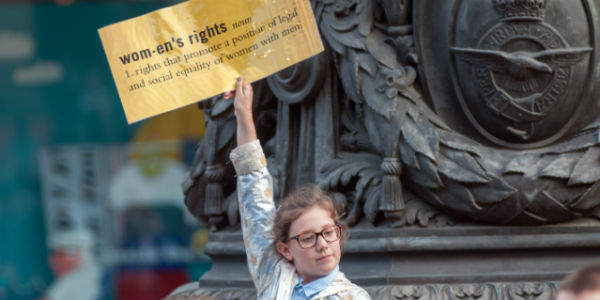Gender and power-sharing – why a Citizens’ Assembly is needed in Northern Ireland
The prospects for Northern Ireland’s power-sharing democracy look bleak. A Citizens’ Assembly is planned for members of the public to deliberate on the disputed topics. Claire Pierson and Jennifer Thomson argue that these forms of public participation have a particular benefit for the representation of women, and has the potential to break down entrenched party political divides.

Girl at an anti-DUP protest, 2017. Picture: Tim Dennell, via (CC BY-NC 2.0)
Northern Irish politics is experiencing one of its most tumultuous periods for decades. The issue of the border between Northern Ireland and the Republic has proven to be an intractable point in the negotiations around the UK’s exit from the European Union. Pro-Brexit Westminster MPs are calling for the Good Friday Agreement to be modified or replaced entirely. The devolved institutions in Belfast remain suspended, with talks between the major parties to re-establish devolved governance dramatically falling apart at the 11th hour.
There is an increasing understanding that formal politics in Northern Ireland is running out of ideas. Stormont has been suspended now for over a year. With the DUP supporting the Conservative government, there is little chance of reconciliation between the major parties, and political compromise on key issues (especially around the issue of the Irish language act) appears impossible. Twenty years after the Good Friday Agreement, the optimism that lead to that historic peace agreement is lacking in Northern Irish politics today.
This is a key moment therefore, to think about how some energy might be reinjected into politics in the region. One proposed way of doing so are the recent plans announced to establish a Citizens’ Assembly in Northern Ireland. The Assembly will be formed of 99 individuals and one Chairperson, carefully selected from the Northern Irish electoral roll to ensure parity of representation with regards to the make-up of Northern Irish society. It will meet at weekends to consider specific topics on which expert witnesses will present evidence. The charity Building Change Trust is funding the project through the Northern Irish think tank Involve.
The Assembly is being designed along very similar lines to a Citizens’ Assembly currently running in the Republic of Ireland. The Assembly in the Republic has been asked to deliberate on several key issues, including abortion, and its support for liberalising laws on terminations provided key encouragement for the Irish government to call a referendum on the issue.
Whilst the body will have no legislative or political powers, it will provide a space for ordinary people to come together to deliberate on key issues – which is especially important in an environment where formal politics have become so immobile. Indeed, such a move towards a more deliberative form of democracy is not unprecedented in Northern Ireland. Within the Good Friday Agreement a provision was put in place for a Civic Forum of local NGOs and civil society bodies which was intended to be a consultative body for the Northern Irish Assembly at Stormont. Following the suspension of the devolved governance in 2002, the Civic Forum was never re-established.
In recent research, we argue that there are additional gendered benefits to a political framework which allows for more deliberative types of democracy such as this. Whilst women lead three of the dominant political parties in Northern Ireland, and women’s representation in the Assembly stands very close to Westminster at 30%, this has not led to substantive consideration of gender policy issues in the region. Discussions on abortion are permeated with conservative and anti-choice rhetoric, rates of domestic and sexual violence are rising in the region but policy on these issues is stagnant with little in particular being done to provide reparation for historical sexual abuse. Within the arenas of peace-building and dealing with legacies of the past, women’s voices are visible by their absence – with the most recent body set up by Stormont, the ‘Flags, Identity, Culture and Tradition’ Commission including 14 men and only one woman.
Yet Northern Ireland has long had a dynamic and sizeable women’s sector, both before and after the Good Friday Agreement. Building more deliberative types of structure into Northern Irish politics, either through a new Civic Forum, the Citizens’ Assembly, or both, would be a key way in which to get more women’s voices into public discussion and to highlight women’s issues more prominently in public debate. Arenas such as these provide an informed, participative and deliberative form of democracy less hampered by the traditional confines and binaries of Northern Irish politics. The results and discussions of such forums can provide legitimacy for politicians to suggest legislative change. This can be clearly illustrated in the Irish example, with the calling of a referendum for May 2018 on a constitutional clause on abortion which has been in place since 1983.
Citizens’ forums can also show that politics can look differently from the shape that it has conventionally taken in Northern Ireland. The peace process, from the Good Friday Agreement, through the St Andrew’s day agreement and the more recent Stormont House agreement, has been dominated by party politics and formal political actors. Increasingly, ordinary people have been left out of key political decision-making. A Citizens’ Assembly would illustrate that normal individuals can play a role in decisions that affect them, and that politics extends beyond parties, elections and Stormont.
The current political climate in Northern Ireland is bleak. Yet the chance to create a new forum for political discussion in the region offers a key opportunity both to move beyond this political impasse and to provide a way to include a wider range of people’s voices and opinions in public debate.
This article represents the views of the authors and not those of Democratic Audit.
About the authors

Jennifer Thomson is a lecturer in Comparative Politics at the University of Bath and Co-Convener of the PSA Women and Politics Specialist Group.
 Claire Pierson is a lecturer in politics at the University of Liverpool.
Claire Pierson is a lecturer in politics at the University of Liverpool.





 Democratic Audit's core funding is provided by the Joseph Rowntree Charitable Trust. Additional funding is provided by the London School of Economics.
Democratic Audit's core funding is provided by the Joseph Rowntree Charitable Trust. Additional funding is provided by the London School of Economics.